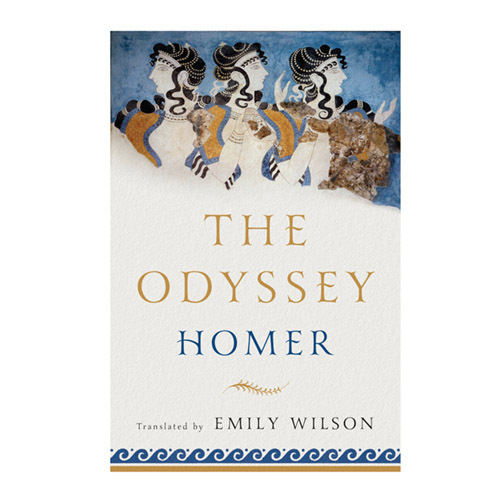- Autumn 2024
- The Odyssey By Homer, translated by Emily Wilson (WW Norton & Company, 2017
The Odyssey By Homer, translated by Emily Wilson (WW Norton & Company, 2017

In Part I of this two-part book review, Emily Wilson’s translation of The Odyssey (2017) is reviewed. In Part II, Emily Wilson’s translation of The Iliad (2023) will be reviewed.
My formal education in the Classics began with the Disney film Hercules (1997) and ended with Ensemble Studios’ PC game Age of Mythology (2002). But late last year, on a whim, I picked up Emily Wilson’s translation of Homer’s epic poems The Odyssey (2017). And, much like Polyphemus, the one-eyed giant who gobbles up four of Odysseus’ men within his island cave on Cyclopes, I devoured it.
The Odyssey follows the eponymous Odysseus’ long journey back home to Ithaca, following the sacking of Troy, at times assisted and at times beset by the gods; Penelope, Odysseus’ wife, who must resist a cadre of suitors who seek to woo and marry her and, in doing so, obtain the family’s manor and land; and Telemachus, the pair’s teenaged son, who seeks to protect his mother and his inheritance but, like Shakespeare’s Hamlet, is a timid spirit laden with self-doubt.
It commences with a beneficent introduction penned by Wilson, who daylights as a Professor of Classical History at the University of Pennsylvania, that informs the reader of the historical, social, and cultural context surrounding the authorship and reception of The Odyssey.
Due, in equal parts, to the timelessness of the ideas explored by Homer and the rules that Wilson had imposed on herself in translating the epic poem, The Odyssey reads remarkably like contemporary fiction. This is, of course, intended as praise. Reading Wilson’s translation, one comes to better understand the stubborn alliance that so often bonds a keen interest in Ancient Greece with the barristerial profession. While much can be gained about how to write and how to speak, just as much can be gained about how to think and how to feel.1
Wilson’s translation of The Odyssey is the same length, and contains the same number of lines, as Homer’s. It is written in iambic pentameter, rather than dactylic hexameters, giving it a familiar anglophonic cadence. These decisions allow the poem a sense of rhythm that is at once both ancient and modern. In Wilson’s words: ‘Homer’s music is quite different from mine, but my translation sings to its own regular and distinctive beat … I wanted a narrative pace that could match its stride to Homer’s nimble gallop.’2 In this way, it is a poem designed to be read as if performed, and not just read on the page.
Wilson’s expression is simple yet evocative – instructively so. A pep talk between Athena and Telemachus, which is to be commended to all barristers in times of anxious crisis, is exemplary:3
Telemachus replied, ‘But Mentor, how can I approach and talk to him? I am quite inexperienced at making speeches, and as a young man, I feel awkward talking to elders.’
She looked straight into his eyes, and answered, ‘You will work out what to do, through your own wits and with divine assistance. The gods have blessed you in your life so far.’
Hermes, the messenger God, is dubbed by second mention as ‘the diplomat’.4 It is a keen choice of translation that says much of his role in the story in a single word. Wilson is capable, too, of flashing humour through bright simile. A reprobate suitor, who mocks Odysseus disguised as an old and frail beggar, says: ‘This greedy pig yaks on like some old woman / scrubbing an oven!’5 The misogynistic insult has staying power. The reader cheers on when Odysseus, ready to enact his vengeance, later declares, ‘Playtime is over’, channelling the lead in an ’80s pulp action film.
If you come to the world of Ancient Greece for its lithe language, you will likely stay for its rendering of a world that shows, rather than tells, its similarities to our own. Odysseus, who is the regular recipient of barristerial epithets such as ‘clever’, ‘cunning’, and ‘the man who can adapt to anything’, is always, ultimately, at the mercies of the gods and other divinities – ready proxies for the advocate who must circumnavigate the spiky questions of the Bench. A barrister’s sense of collegiality is also found in the imperatives commanded by Zeus himself. On finding a shipwrecked Odysseus, the Phaeacian princess Nausicaa says to a pair of frightened slave girls: ‘We must look after him. / All foreigners and beggars come from Zeus, / and any act of kindness is a blessing.’ This concept of xenia, a word that means both ‘hospitality’ and ‘friendship’, is central to plot developments and to a particular version of Ancient Greece as rendered by Homer. Indeed, Wilson tells us, ‘Xenios’ is a standard title for Zeus; it means ‘God of Strangers’.6
Wilson’s translation of The Odyssey is a delight to read. Her use of simple language is designed to evoke the oral tradition in which the poem would have originally been performed.7 Further, the poem’s clear but richly textured morality invites a ready and contemplative escape. To paraphrase Lady Hale, quoting Jonathon Crow QC, Wilson’s translation of The Odyssey ‘bristles with simplicity’.8 It venerates the virtue of the simple over the vice of the needlessly cluttered and obtusely complex. BN
ENDNOTES
1 For a detailed review of the relevance of the Ancient Greeks to the current practice of advocacy, see: RCA Higgins, ‘‘The empty eloquence of fools’: Rhetoric in Classical Greece’ in JT Gleeson and RCA Higgins, Rediscovering Rhetoric: Law, Language and the Practice of Persuasion (Federation Press, 2008) 3.
2 The Odyssey, p. 82.
3 Ibid, p. 136.
4 Ibid, p. 183.
5 Ibid, p. 409.
6 Ibid, p. 29.
7 Ibid, p. 29.
8 Singularis Holdings Ltd v Daiwa Capital Markets Europe Ltd [2019] UKSC 50: at [1].

